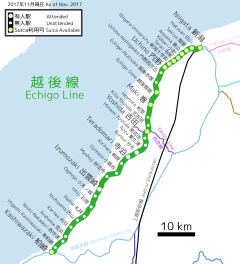Kobari Station
This article needs additional citations for verification. (November 2016) |
Kobari Station 小針駅 | |||||||||||
|---|---|---|---|---|---|---|---|---|---|---|---|
 A local train at track 2 in December 2013 | |||||||||||
| Location | 5-12 Kobariminamidai, Nishi-ku, Niigata-shi, Niigata-ken 950-2026 Japan | ||||||||||
| Coordinates | 37°53′23″N 138°59′29″E / 37.8897°N 138.9914°ECoordinates: 37°53′23″N 138°59′29″E / 37.8897°N 138.9914°E | ||||||||||
| Operated by | |||||||||||
| Line(s) | ■ Echigo Line | ||||||||||
| Distance | 76.3 km from Kashiwazaki | ||||||||||
| Platforms | 2 side platforms | ||||||||||
| Other information | |||||||||||
| Status | Staffed ( "Midori no Madoguchi") | ||||||||||
| Website | Official website | ||||||||||
| History | |||||||||||
| Opened | 1 June 1960 | ||||||||||
| Passengers | |||||||||||
| FY2017 | 2,605 daily | ||||||||||
| Services | |||||||||||
| |||||||||||
| Location | |||||||||||
 Kobari Station Location within JR Echigo Line | |||||||||||
Kobari Station (小針駅, Kobari-eki) is a railway station on the Echigo Line in Nishi-ku, Niigata, Niigata Prefecture, Japan, operated by East Japan Railway Company (JR East).
Lines[]
Kobari Station is served by the Echigo Line, and is 76.3 kilometers from the starting point of the line at Kashiwazaki Station.
Layout[]

The station consists of two ground-level opposed side platforms connected by a footbridge, serving two tracks.
The station has a "Midori no Madoguchi" staffed ticket office. Suica farecard can be used at this station.[1]
Platforms[]
| 1 | ■ Echigo Line | for Yoshida |
| 2 | ■ Echigo Line | for Niigata |
History[]
The station opened on 1 June 1960. With the privatization of Japanese National Railways (JNR) on 1 April 1987, the station came under the control of JR East.
Passenger statistics[]
In fiscal 2017, the station was used by an average of 2605 passengers daily (boarding passengers only).[2]
Surrounding area[]
- Niigata Industrial High School
- Kobari Junior High School
- Kobari Elementary School
See also[]
References[]
- ^ Suica>利用可能エリア>新潟エリ��>拡大図 [Suica Area in Niigata] (in Japanese). Japan: JR East. Retrieved 17 November 2017.
- ^ 各駅の乗車人員 (2017年度) [Station passenger figures (Fiscal 2017)] (in Japanese). Japan: East Japan Railway Company. 2018. Retrieved 11 September 2018.
External links[]
| Wikimedia Commons has media related to Kobari Station. |
- JR East station information (in Japanese)
- Stations of East Japan Railway Company
- Railway stations in Niigata (city)
- Railway stations in Japan opened in 1960
- Echigo Line

